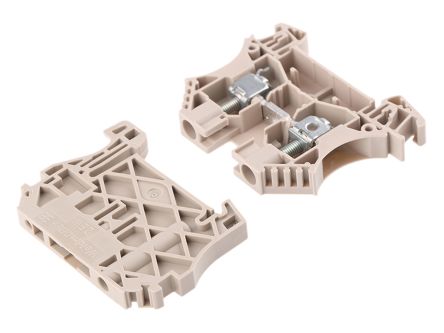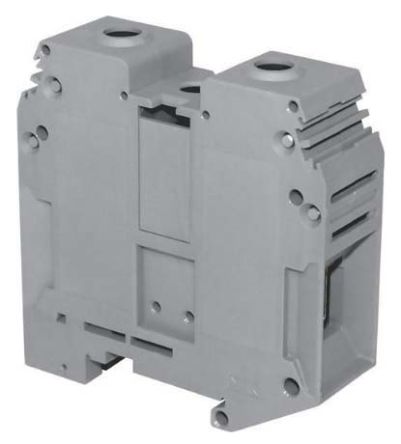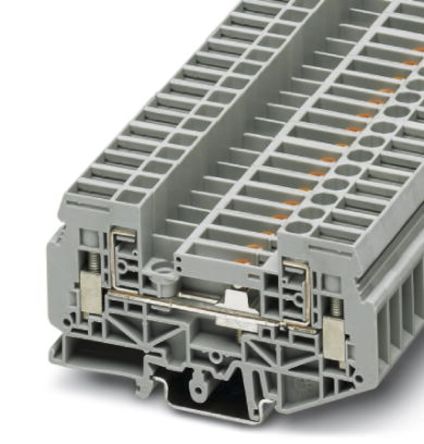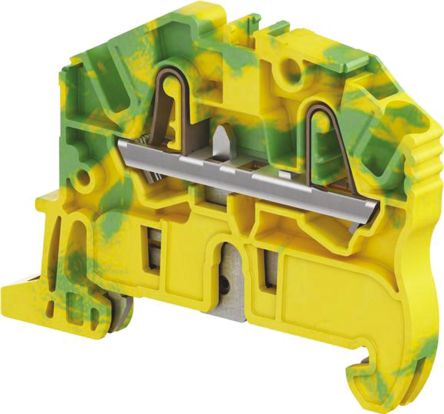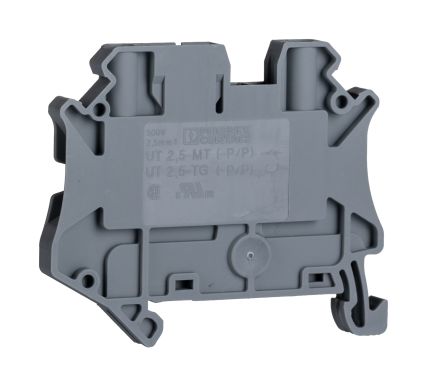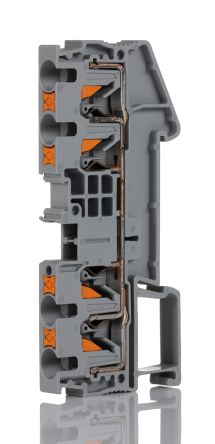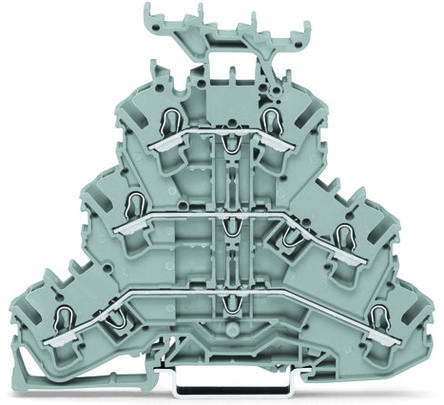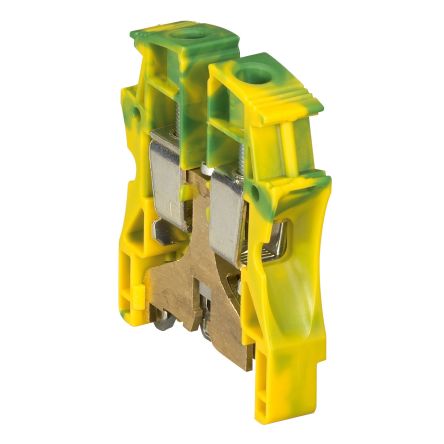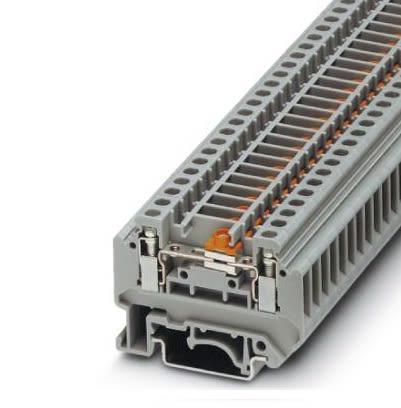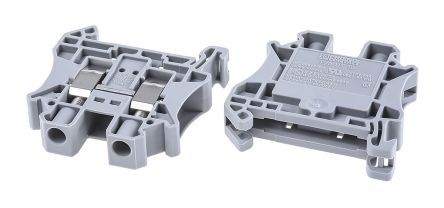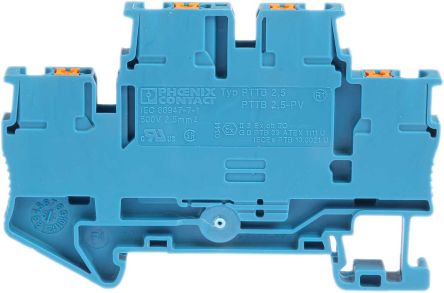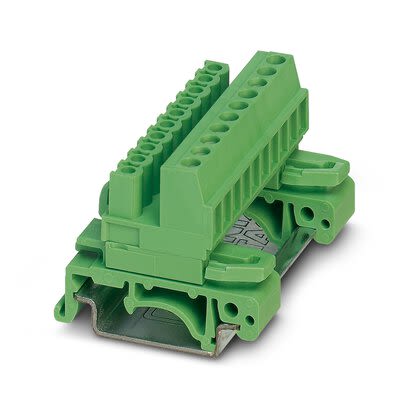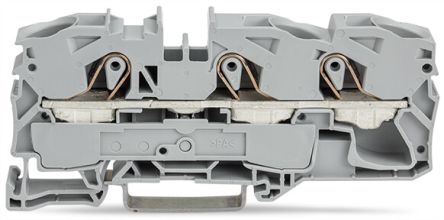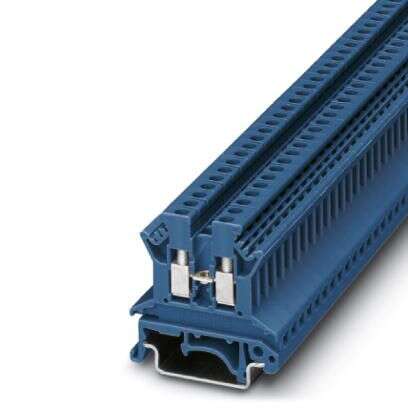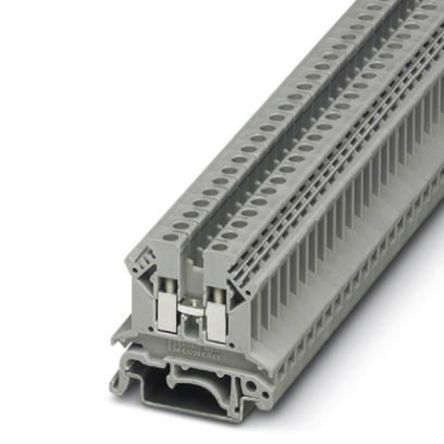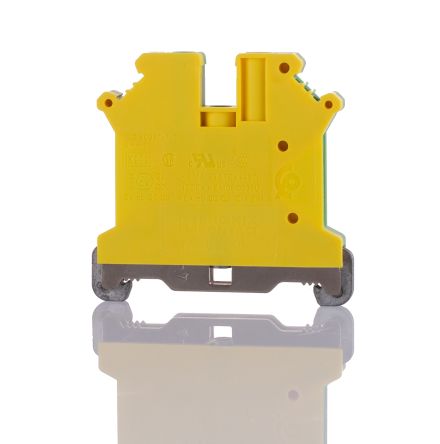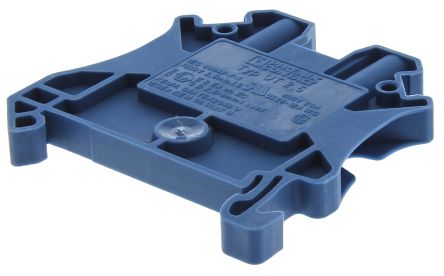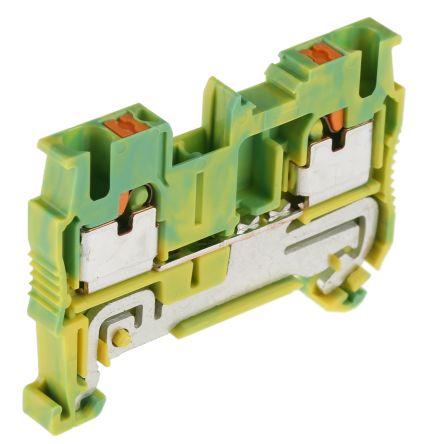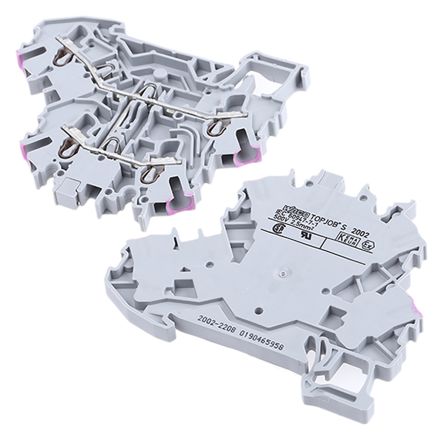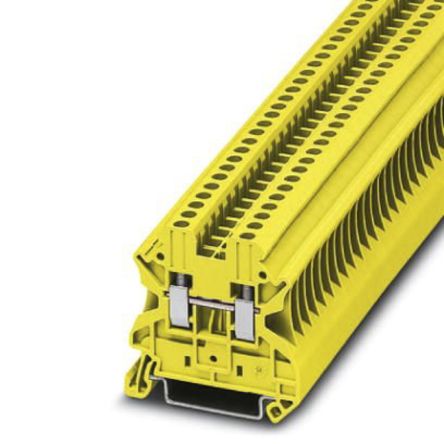- Automation & Control Gear
- Cables & Wires
- Enclosures & Server Racks
- Fuses & Circuit Breakers
- HVAC, Fans & Thermal Management
- Lighting
- Relays & Signal Conditioning
- Switches
- Batteries & Chargers
- Connectors
- Displays & Optoelectronics
- ESD Control, Cleanroom & PCB Prototyping
- Passive Components
- Power Supplies & Transformers
- Raspberry Pi, Arduino, ROCK, STEM Education & Development Tools
- Semiconductors
DIN Rail Terminal Blocks
DIN rail terminal blocks are used to connect and secure electrical wiring within control cabinets. These terminal blocks clip onto a DIN rail, a standard metal rail that allows for organised and efficient wiring systems. Designed to prevent overcurrent and short-circuiting, DIN rail terminal blocks ensure safe and reliable electrical connections.
Types of DIN Rail Terminal Blocks
DIN rail terminal blocks come in various types, each designed to meet specific application needs. Understanding the different types of levels, connectors and termination methods can help you choose the right terminal block for your project.
Levels
- Single-Level Terminal Blocks: These are the most common type of DIN rail terminal blocks. They feature a single row of connectors and are used for straightforward wiring tasks.
- Double-Level Terminal Blocks: These terminal blocks provide two rows of connections, allowing for more compact wiring solutions. They are ideal for applications where space is limited.
- Triple-Level Terminal Blocks: With three rows of connections, these DIN rail mounted terminals offer even higher density wiring. They are used in complex control systems where multiple connections need to be managed efficiently.
- Ground Terminal Blocks: These blocks are specifically designed to provide a secure grounding point for electrical systems. They often feature a green-yellow marking for easy identification.
Termination Methods
- Screw Termination: DIN rail screw terminal blocks are the traditional method, providing a secure and reliable connection by tightening a screw onto the wire. They are suitable for a wide range of wire sizes and types.
- Spring-Cage Termination: Spring-cage terminal blocks use a spring mechanism to hold the wire in place. This method offers quick and easy installation without the need for tools, making it ideal for applications requiring frequent connection changes.
- Push-In Termination: Push-in DIN rail terminal blocks allow for direct insertion of solid or stranded wires with ferrules. This method ensures a secure connection with minimal effort, making it ideal for high-density wiring applications.
- Pluggable Termination: Pluggable terminal blocks feature connectors that can be easily plugged and unplugged, facilitating rapid assembly and maintenance. They are used in applications where modules need to be replaced or reconfigured frequently.
How Do DIN Rail Terminal Blocks Work?
DIN rail terminals are made from plastic, as this insulates the electrical current running through the terminal. Fused DIN rail terminals often have a hinged section containing the fuse, which can be opened up to stop the flow of electricity. Some are fitted with an LED blown fuse indicator to let you know when the fuse needs changing. Fused DIN rail terminals come with different fuse size inserts and may be colour coded to indicate the current rating. Non-fused work the same, just without the fuse protection.
What Are Fused DIN Rail Terminals Used For?
Fused DIN rail terminals are widely used in industrial applications where additional protection from overcurrent is crucial. These terminals incorporate a fuse within the terminal block itself, providing an extra layer of safety compared to non-fused DIN rail terminals. By integrating a fuse, these terminals can protect individual circuits from overcurrent, preventing damage to sensitive components and reducing the risk of fire.
Fused DIN rail terminals are commonly used to protect sensors, relays, and other critical control equipment. For example, in automated manufacturing systems, these terminals ensure that if a sensor or relay experiences a fault or draws excessive current, the fuse will blow and isolate the fault, preventing it from affecting the rest of the system. This targeted protection helps maintain the integrity and reliability of the entire control system.
Additionally, fused DIN rail terminal blocks are used in power distribution panels to safeguard individual circuits. They provide an easy and organised way to manage circuit protection, ensuring that each circuit has the appropriate level of overcurrent protection. This is particularly important in complex electrical systems where different circuits may have varying current requirements.
Industrial Applications of DIN Rail Terminal Blocks
DIN rail terminal blocks are versatile components used across a wide range of industrial applications. They provide secure and efficient connections for electrical wiring, enhancing safety and organization in various systems.
Energy Management
DIN rail terminal blocks are crucial in energy management systems, helping to connect and secure wiring for energy metres and power monitoring devices. For example, in solar power installations, DIN rail mounted terminals are used to manage and distribute generated power effectively, ensuring reliable connections between solar panels, inverters, and energy storage units.
Power Supplies
DIN rail terminal blocks are essential in power supply systems, ensuring reliable connections for power distribution units and converters. They are commonly used in industrial control panels to distribute power safely to various components. DIN rail fuse terminal blocks are often utilised to provide overcurrent protection, safeguarding sensitive equipment from electrical faults.
Lighting Controllers
DIN rail terminal blocks play a key role in lighting control systems, providing connections for dimmers, switches, and controllers. In commercial buildings, DIN rail mounted terminal blocks are used to manage complex lighting systems efficiently, allowing for centralised control and automation of lighting fixtures, which improves energy efficiency and user comfort.
Telecommunications
In telecommunications, DIN rail terminal blocks are used to organise and secure connections for network equipment and communication devices. They ensure reliable connectivity in data centres and telecommunication hubs. DIN rail screw terminal blocks are often employed to secure network cables, ensuring stable connections for uninterrupted data transmission.
Building Management Systems
DIN rail mounted terminal blocks are integral to building management systems, facilitating the connection of sensors, actuators, and controllers. They help manage HVAC systems, lighting, and security in smart buildings. For example, DIN rail terminal block connectors are used to integrate various building subsystems, ensuring seamless communication and efficient operation of the entire infrastructure.
Industrial and Civil Electrical Installations
DIN rail terminal blocks are widely used in both industrial and civil electrical installations, providing secure connections for machinery, equipment, and building infrastructure. In factories, 16mm DIN rail terminals are utilised to connect heavy machinery to power sources, while mini DIN rail terminal blocks are used for smaller equipment and control panels.
Heating and Air Conditioning Controls
These terminal blocks are used in heating and air conditioning systems to connect thermostats, sensors, and control units. They help ensure efficient and reliable operation of HVAC systems in residential and commercial settings. DIN rail ground terminal blocks are often used to ensure proper grounding of HVAC units, enhancing safety and performance.
How to Order DIN Rail Terminal Blocks from RS
RS is a trusted supplier and distributor of DIN rail terminal blocks, offering a wide range of products from leading brands such as RS PRO, Phoenix Contact, Wago, Siemens, and more. Our extensive selection ensures that you can find the perfect DIN rail terminal block for your specific needs.
To place an order, simply browse the RS website and use the filter options to narrow down your choices. You can filter by brand, number of levels (single-level, double-level, etc.), and whether the terminal block is fused or non-fused. Additionally, you can select cable CSA (Cross-Sectional Area) options ranging from 4mm, 6mm, 10mm, 16mm, to 35mm, ensuring that you get the right terminal block for your wiring requirements.
Once you’ve found your desired DIN rail terminal block, simply add it to your cart and proceed to checkout.
**Delivery Information for Australia **
For efficient delivery of our DIN rail terminal blocks and other products across Australia, we recommend placing your orders by 5 pm AEST on weekdays. RS provides next-business-day delivery for products available in our local inventory.
However, please note that deliveries to some remote areas might take longer. To explore our full range of delivery services, which include expedited same-day delivery and options for consolidated shipments, please refer to our delivery information page for detailed guidance.
Popular Searches
Related links
- RS PRO DIN Rail Terminal Block Single-Level, Screw Termination
- RS PRO DIN Rail Terminal Block Single-Level
- Entrelec1SNA115498R1700 SNA Series Double Level Terminal Block...
- Phoenix Contact3005646 UK 10-DREHSILED 24(6.3X32) Series Modular...
- Weidmuller1781740000 WDU Series DIN Rail Terminal Block Screw Termination
- Entrelec1SNK505230R0000 ZS4-D2 Series Double Level Terminal Block...
- Weidmuller1021500000 WDK Series Double Level Terminal Block...
- Phoenix Contact3002613 DIN Rail Terminal Block Push In Termination
